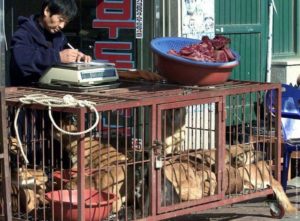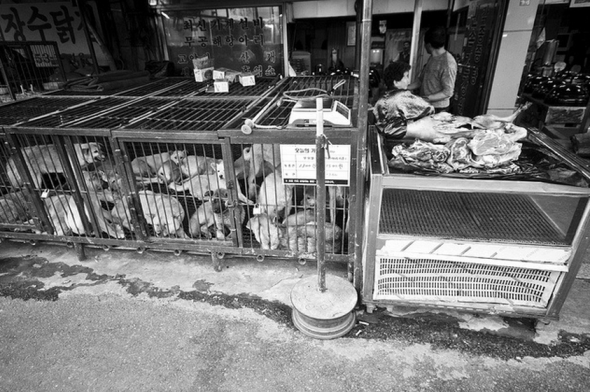South Korea which is located in the southern half of the Korean Peninsular of east Asia will this July to early August host its annual dog meat-eating festival commonly known as “Bok Day”, “Bok Days” or the Malbok Festival. The festival normally begins on the 13th July or 21st July, and runs into early August which is considered the hottest days of the year within the country.
It’s during this event that South Korean dog and cat meat markets will begin a mass slaughter of dogs and cats. One particularly commonly killed dog is the “Nureongi” a yellowish traditional dog breed that has been bred to specifications over time within East Asia.
Sambok or the dog days of summer, covers a month of time at the peak of the growing season and traditional time that to some South Koreans is classified as a traditional time to cool off and extract some medicinal healing powers from the consumption of dog meat. In reality there still remains no proof or medical evidence that supports the East Asian pet meat consuming beliefs that such meats increase human health.
During the festival dogs will be seen roasted and served on a spit, and prepared in stews too.
Despite laws that have been drafted into place to halt such abuse, dog and cat meat traders will this July into early August beat, blowtorch, hang and inhumanely kill countless dogs and cats. Back in 2007 the south Korean government made history by making “An act of killing in a cruel way such as hanging” and “an act of killing in an open area such as on the street or in front of other animals of the same kind watching” are explicitly prohibited until Article 7 (1) of the Animal Protection Act of 2007. Unfortunately the laws apply to abuse rather than prohibiting the trade full stop.
However sadly, dogs and cats are brutally beaten in front of their companion friends (a violation of APA 2007), electrocuted (a violation of the APA 2007), hung from rafters in the markets alive (a violation of the APA 2007) and, furthermore street vendors continue to kill in open spaces as well within the center of the market (a violation of the APA 2007 Act) – excluding the center market place).
Updates to the policy from 2008 can be briefly read below. The policy is believed to have been brought into practice back in 1991
Animals under protection should be free from the following (Article 3 Animal Protection);
- Hunger and thirst.
- Able to express natural behavior.
- Free from pain and disease.
- Free from fear and stress.
Animal Welfare Act Plan should be updated every 5 years and local governments shall cooperate with the central government.
The Animal Welfare Act Plan includes the following:
- Basic policies on animal welfare and prevention of animal abuse.
- Management of lost and abandoned animals.
- Policy on Animal Experiment Ethics Committee.
- Policy on farm animal welfare.

Estimated statistics on consumption and ownership:
- Trader 1 – Dog and cat meat restaurants number around 500-600 in Seoul alone.
- Trader 2 – During the last summer festival “estimates” of some 5 to 6 million dog meat dishes were sold during the twenty-one day event.
- Trader 3 – According to the Korean Kennel Foundation it’s believed that some 3.5 to 5.0 million dogs are kept as companion pets nationwide.
Estimated south Korean dog price and slaughter info:
- Gyeongdong Market in central Seoul – trader 1 states that the average price of slaughter/preparation/cooking and bagging is around 150,000 won.
- The current starting price for one dog comes in at 120,000 won and can exceed 190,000 won to 200,000 won stated trader 2.
- Separate pieces of dog meat are usually sold by weight, 5,000 won per geun (1.3 pounds/0.6 kilograms) explained trader 3.
- Another commonly served dish is sliced dog meat. A whole dog usually costs around 300,000 won in restaurants trader 4 stated.
- Gyeongseong Oriental Medicine Clinic, located near the market ask 350,000 won for a month’s worth of gaesoju; they charge half that if the customer provides the dog. Customers have to pay 20,000 won extra for slaughtering.
SEND A LETTER TO THE KOREAN AUTHORITIES ASKING TO STOP THIS ABUSES! CLICK HERE




